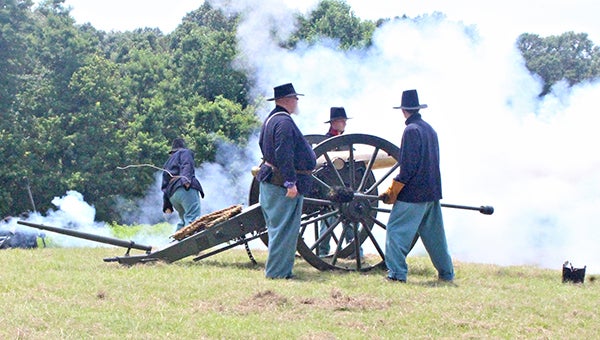SIEGE 160: Grant relieves corps commander after self-congratulatory order published
Published 8:00 am Saturday, June 17, 2023

- Volunteers fire a cannon during a demonstration at the Vicksburg National Military Park in 2021. The Park is commemorating the 160th anniversary of the Siege of Vicksburg this year. (File/The Vicksburg Post)
It’s June 18 and activity along the front lines is stagnant as Union engineers and troops continue getting closer to the Confederate lines located at what is now the northern part of the Vicksburg National Military Park and begin operations in the park’s southern section.
But behind the lines, a tempest is brewing and it leads to Maj. General Ulysses S. Grant removed one of his corps commanders, Maj. Gen. John Alexander McClernand.
Unlike Grant and his other two corps commanders, Maj. Gen. William T. Sherman and Maj. Gen. James B. McPherson, who are West Point graduates, McClernand is a political appointee.
“He was a friend of Lincoln,” said Andrew Miller, lead park ranger at the Vicksburg National Military Park.
McClernand, he said, was a war Democrat from Southern Illinois and a congressman who was essential to keeping Southern Illinois, an area where many residents had relatives in Tennessee and opposed to the war.
“He’s influential; he’s got Lincoln’s ear but as the war goes on and as Grant is really becoming successful, McClernand really starts to lose his clout with the Lincoln administration.”
The event that caused Grant to relieve McClernand of command of the 13th Army Corps was a congratulatory order McClernand put in several Northern newspapers congratulating him and his corps for its performance in the Vicksburg campaign up to the start of the siege.
“Those newspapers make their way to Grant’s army and of course, as you can imagine, the other corps commanders, McPherson and William T. Sherman are pretty miffed that he wrote this congratulatory order that basically gives credit to himself and his Army Corps at the detriment of the other two commanders and their Army Corps,” Miller said. “That they had virtually done nothing during the campaign, and it was all McClernand and his men that had basically prosecuted the campaign up to this point.”
McClernand also lays the blame for the unsuccessful May 22 assaults on the Confederate defenses on the lack of coordination between Grant and his other two corps commanders and claimed that he could have actually captured the city if McPherson and Sherman had helped him — a statement that is incorrect.
To remove McClernand, Grant uses a general order published in March of 1862 by the War Department prohibiting the publication of military information, congratulatory orders and similar items in newspapers for the secrecy of the information as to the detriment of the soldiers and civilians reading the information.
“So there was an order in place that was not rescinded, and that is what Grant utilized to get rid of John McClernand and replace him with a trusted subordinate, Edward O.C. Ord,” Miller said. He said statues of McClernand and Ord are together in the South Loop at the Vicksburg National Military Park.
“You have McClernand on an equestrian statue and right beside him just a standing statue is Edward O.C. Ord,” he said.
Ord, Miller said, would remain in command of the 13th Corps through the remainder of the siege through the, the, the, uh, engineering operations and at the time, the surrender itself.
On the Confederate side, the troops are stagnating. The temperatures are the hottest on record, there’s no rain and the troops are struggling. Pemberton is convinced that Gen. Joseph Johnston is not coming to relieve him despite rumors that Johnston is coming.
Ammunition is running low and rations are being cut to half-rations.
“As Grant’s siege operations are really starting to take hold, the lack of anything coming between the lines is really starting to affect the health and morale of the Confederate soldiers,” Miller said.






